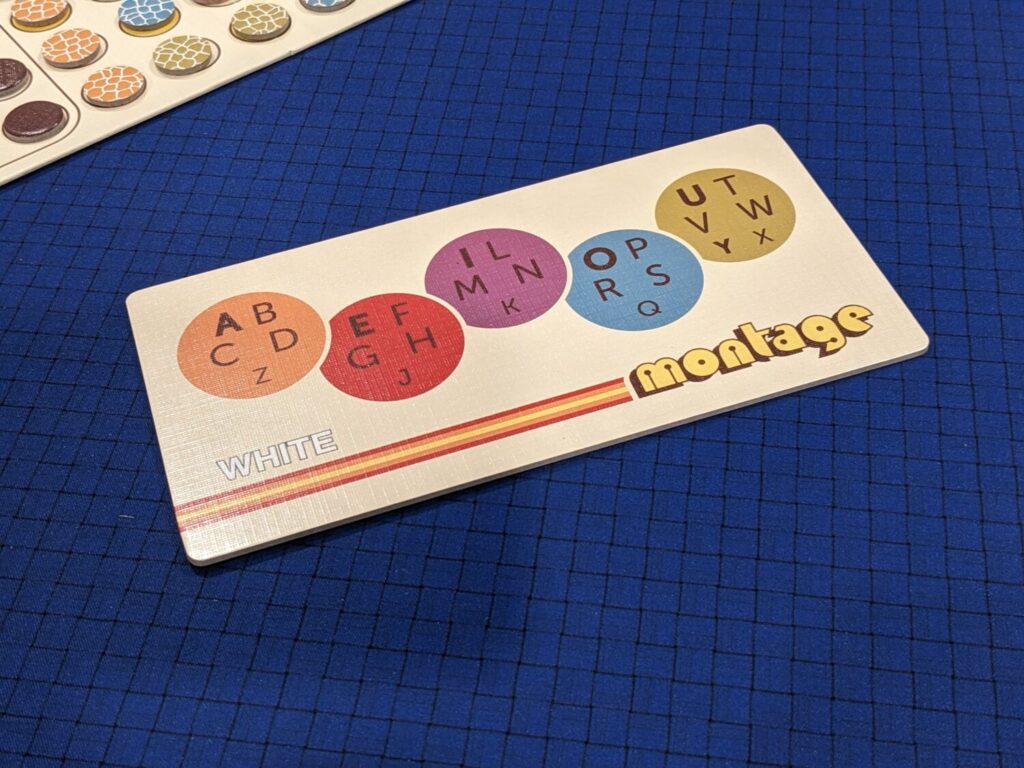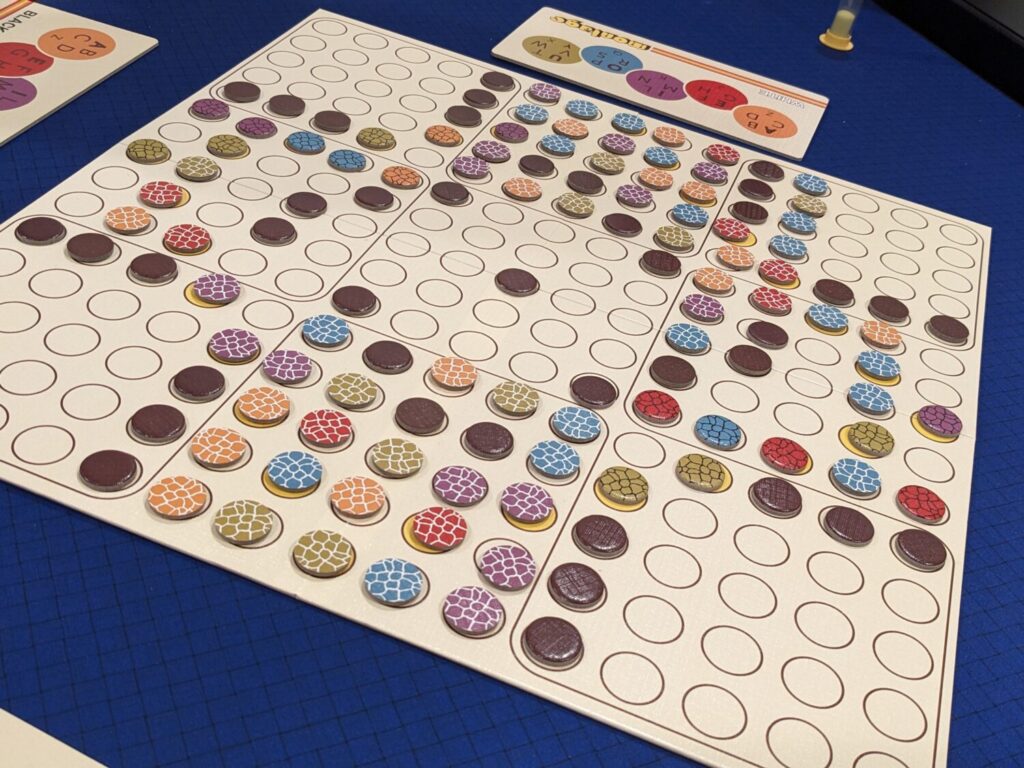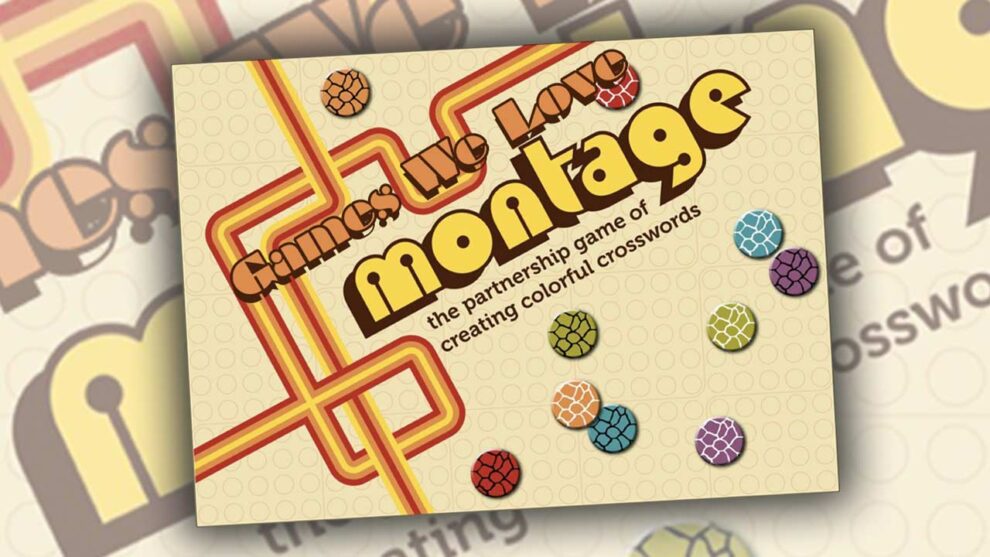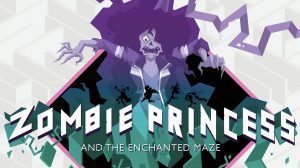Disclosure: Meeple Mountain received a free copy of this product in exchange for an honest, unbiased review. This review is not intended to be an endorsement.
If you’ve followed my content over the last 12-18 months, you know that I have been laser focused on covering older titles. Our partners at Eagle-Gryphon Games have a library of games so large and so varied that I usually start by making requests to their team to cover games that are a few years old, including recent gems such as Blockers!, Pastiche, and Florenza.
Another game on my list was Montage, for one simple reason: the game’s cover art looks like it was airlifted from a bad TV show in 1974. As it turned out, I was off by a year: Montage, published by Gryphon Games in 2011, is a game that was first released in 1973. Designed by Joli Quentin Kansil and developed by Eagle-Gryphon Games founder Rick Soued, Montage is something else…and that something else, for a specific audience, is a fantastic experience.
I recently convened my review crew for a first play of Montage, and I didn’t even want to wait for a third or fourth play to share my experience. Montage is incredible.

Ready, Set, Orange
Montage is a tough one to classify, but here’s what we will start with: Montage is a real-time, area majority spelling game for exactly four players split into teams of two.
Just that description alone leans into our group’s feeling after this single play: finding the right people to play a timed word attack game that made my man Rex call Montage “Skirmish Scrabble” is going to be a challenge for some groups.
Let’s start with why. In Montage, players are split into teams then seated across the table from their respective partners. The board is a grid broken into nine zones, with each zone featuring a pattern of circles with some spaces filled with dark tan pips, other spaces filled with circular chits in one of five colors, and other spaces left empty. The game comes with a plethora of setup variations to ensure that each starting arrangement is unique.
Each team is assigned a color—black or white—and each player is given a player aid. That player aid serves as the main reference point in Montage, because of a clever word association guide based on the five different types of colored discs in the game.
Each of the five disc colors can serve as up to six specific letters. Orange represents A, B, C, D, and…Z. (I know, but bear with me.) Purple is I, L, M, N, and/or K. In a zone, these discs are seeded so that the active player, known as the “Quizzer”, can formulate words using at least one disc in that word to give a clue to their partner. Also within each zone, those dark tan pips represent blacked-out spaces, sort of like the solid black squares in a crossword puzzle.
So, in a player’s zone, the Quizzer’s goal is to give a clue that they hope can only be deciphered by their partner. But when the one-minute timer starts, all players are in the action, because the opposing team can steal a word if both of them knock on the table to indicate that they know the answer. That puts pressure on the Quizzer to come up with a great clue that they think will snow the opposition. That also puts pressure on the partner, because as long as they knock first—or even second, giving the active team a handsome advantage—and get the answer right, they might be able to keep their turn alive and stay in control of a turn.
My favorite finding about this, though, is that this also puts a lot of pressure on the opposing team on every turn too! Stealing words is crucial, because the team that gets 10 markers of their color placed in a zone first wins that zone (markers are added to empty spaces when a word is solved), and winning four zones seals the victory.

Creativity, Timed Play, Partners, Aggressive
Montage unlocked something in me by the end of that first play.
I always knew I liked team games; in fact, I much prefer team-based co-op play over fully cooperative games. (This is, in part, why I love party games like Wavelength just a hair more than full co-op games like Just One.) Montage is absolutely a team game, but it does push players to find their word association/clue-giving equal when teaming up. In this way, Montage might be a great game for competitive couples…as long as partners find themselves on equal footing.
Montage is an area control game, and there’s a nice amount of strategy to going for larger words with a couple of colored discs already seeded on the board versus going for small words when trying to close out a zone. I also loved the moments when players had to come up with three- or four-letter words that already had most of a word formed on the board. At those stages, players had to come up with a great clue and hope their partner could come up with the answer as quickly as possible.
The creativity is on display everywhere in Montage. My favorite part of the design is the first question Meeple Mountain contributor Joseph Buszek asked during the teach. “What’s to stop anyone from just, you know, making up an answer that fits the space where the active word is going to be given? I see one red disc on the table in that word space, in the third letter position…couldn’t I just say that F-R-E-S-H is the answer, since E is part of the red chit’s letter set?”
The answer to that question is yes, but not really. Sort of. You see, a player can answer a Quizzer’s query—which has to be five words or less when offering a clue—with any legal answer that fits the clue, as long as it fits the space.
That means that a player could answer the following clue in multiple ways: “pepperoni, sausage, mushrooms.” They could legally answer with P-I-Z-Z-A…or S-A-U-C-E, if the first letter in a five-letter word space had a blue token holding that first position. (Blue represents the letters O, P, R, S, and Q.) Both are related to pizza, and both fit the spot. That left players coming up with fun ways to get their partner to answer the way they needed to answer, even if their respective answer words were not a match.

For Me, It’s Perfect
Meeple Mountain contributor Thomas Wells noted that Montage was his favorite word game when I told the team I had picked up a review copy. Now that I’ve played it, Montage has earned the right to sit alongside the other great word games on my permanent shelves.
Those professors who work at a local university? Those friends are the ones I want to show Montage to next. Friends who like to team up for pressurized, real-time gaming experiences? They are getting the call, too. Fans of tactical war games? They might fit, too, and players who love winning—those who really love tournament-style competition—will also be on the dance card.
Across my gaming circles, I only know a few people who enjoy games like this, and I have a sneaking suspicion this is why I hadn’t heard anyone else talking about Montage—a 50-year-old game!!!—until I got it to the table. Now that I have Montage, I’m never letting it go. Montage is my kind of spelling game, and I’m excited to get it back to the table!











I’m really pleased to see Montage reviewed. This game had its origins in the late 1960’s, early 1970’s in the Gamut of Games series, and then it was resurrected by Rick Soued and his team at Eagle/Gryphon. It’s a very heady game, requiring quick wit and improvisational thinking, and it is linked to an interesting abstract approach to territorial gain,. There is no game quite. like it, but it takes a very specific type of player to enjoy it. Thanks for bringing this game back to life, Justin. Next up should be Prince Joli Kansil’s classic Marrakesh!